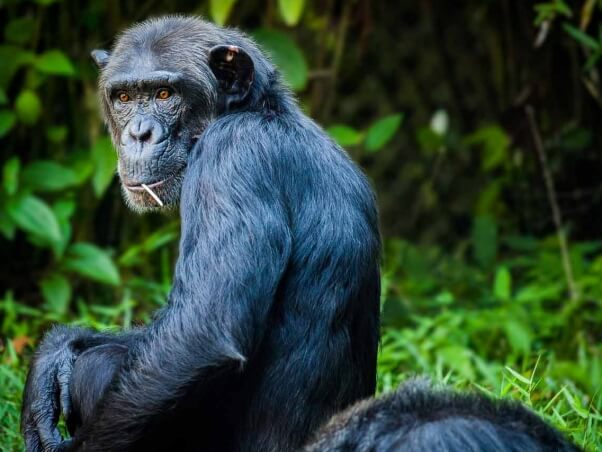PETA Praises Shutterstock for Banning Unnatural Images of Primates
Monkeys and apes used for photo shoots and other forms of entertainment are typically very young and deprived of everything that is natural and important to them, including contact with their mothers. Images of these animals in unnatural settings can harm conservation efforts and may increase the demand for these wild animals as “pets.” After discussing these issues with PETA, Shutterstock—the world’s largest subscription-based stock-photo agency—made the decision to remove and ban all photographs and videos of these species in unnatural situations from both its collection and those of its subsidiary Bigstock.
Shutterstock will no longer allow photographs and videos that feature monkeys or apes in the following situations:
- Wearing clothing or accessories, such as hats or sunglasses
- Being shown in a studio setting or human environment, such as an office or circus
- Exhibiting trained or unnatural behavior, such as dancing or performing
- Engaging in unnatural interactions with humans, such as holding hands or being held
Images of wild apes or monkeys that have been digitally altered to place them in any of the unnatural situations listed above are also banned. Photographs of these animals in zoos or living free in natural habitats or in Asian cities (for example, macaques who inhabit temples) will still be allowed.

Shutterstock’s decision is a reflection of evolving industry standards, as well as a sea change in public opinion: Consumers are more aware than ever of the suffering that wild animals endure when they’re used for any form of entertainment. The vast majority of ad agencies—including BBDO, McCann, J. Walter Thompson, Droga5, Grey Group, and DDB—have pledged never to use great apes in their ad campaigns.
Did you know that the “smile” exhibited by chimpanzees on greeting cards is actually called a “fear grimace” and that physical abuse during pre-production training is typical? Chimpanzees and orangutans used in these images are usually taken from their mothers shortly after birth, causing psychological trauma to both animals. When they reach adolescence and become too strong to dominate, trainers often discard them in substandard facilities, where they may be kept alone in poor conditions for decades.

Thank you, Shutterstock!
By banning unnatural images of apes and monkeys, including depictions of those exploited as “actors,” Shutterstock has made a huge difference for nonhuman primates, both in the wild and in captivity. Ad agencies and film and television producers have already moved away from using these harmful images, and we hope other stock-photo providers follow the company’s lead.

